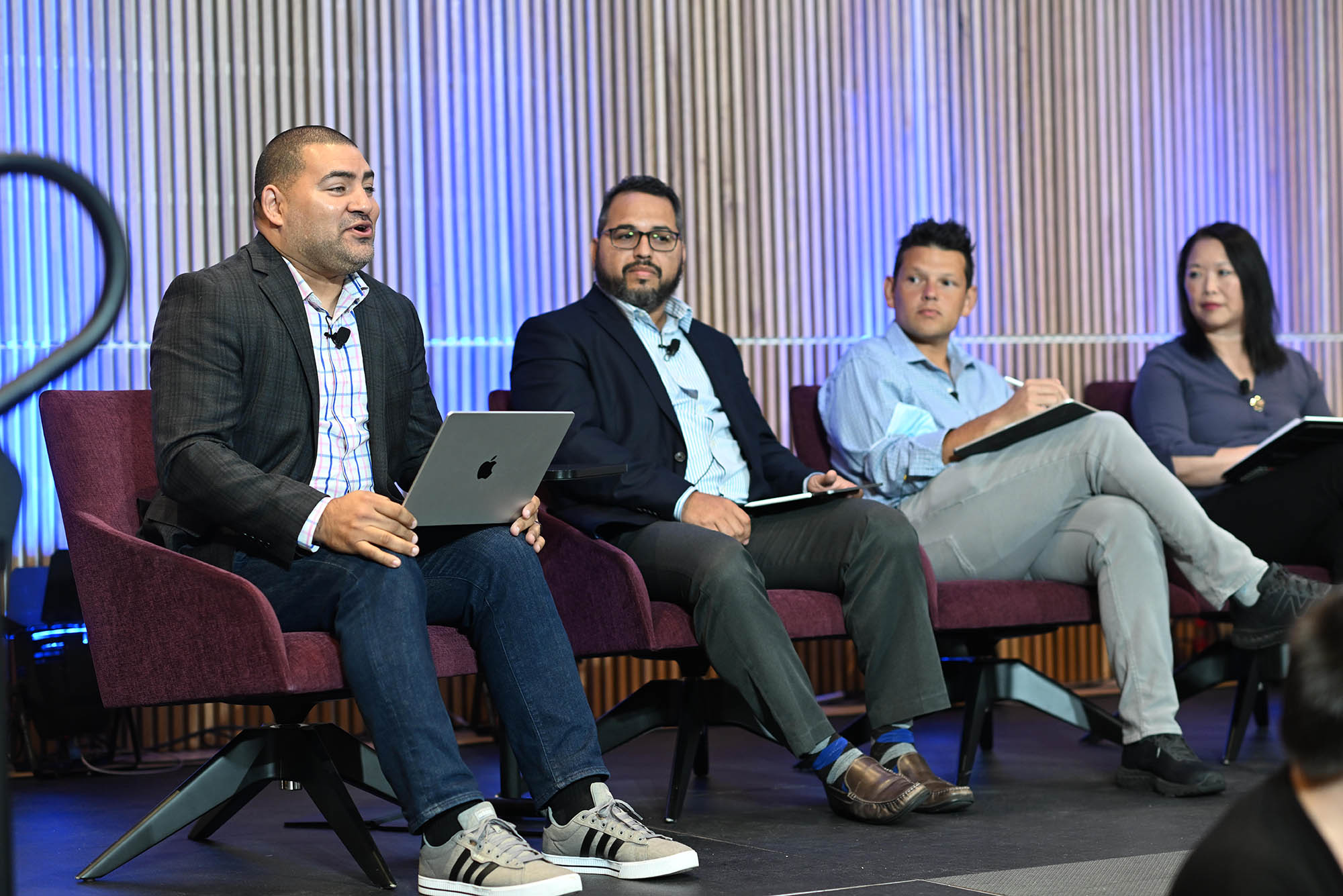Post Affirmative Action, Will Campuses Welcome Economically Disadvantaged Students?
A Wheelock College panel ponders the future of diversity in higher education

On a panel discussing the college admissions landscape after the Supreme Court’s affirmative action ruling were moderator Raul Fernandez (COM’00, Wheelock’16) (from left), Amin Abdul-Malik Gonzalez, Iván Espinoza-Madrigal, and Maria Dykema Erb.
Post Affirmative Action, Will Campuses Welcome Economically Disadvantaged Students?
A Wheelock College panel ponders the future of diversity in higher education
You’ve been misinformed by hyperventilating reportage: the Supreme Court did not end race-based admissions preferences in higher education last year. So says Iván Espinoza-Madrigal, executive director of the Boston-based nonprofit Lawyers for Civil Rights.
“The idea that the Supreme Court killed affirmative action—that’s a myth,” Espinoza-Madrigal said during an October 3 forum at BU’s Howard Thurman Center for Common Ground. “Race-conscious admission was not overruled.”
Rather, the court found that considerations of applicants’ races by Harvard, which was sued by conservative activists, wasn’t narrowly tailored enough to pass constitutional muster, Espinoza-Madrigal noted, adding that race can still be a consideration in a “holistic” process. (For example, the court said students could broach it in their application essays.)
Portraying affirmative action as illegal is the “weaponization” of the court’s decision by racial preferences opponents, he said. The goal now, he argued, should be eliminating other admissions breaks—for children of alumni and donors and “aristocratic sports preferences” for student athletes—that mostly benefit wealthy white families. (Espinoza-Madrigal’s group has sued Harvard over its use of the first two.) “If we’re going to eliminate preferences, we need to eliminate all of them,” he said. “Just because you know how to fence doesn’t mean you deserve a spot.”
Just because you know how to fence doesn’t mean you deserve a spot.
He got amens from fellow panelists at the forum, sponsored by Wheelock College of Education & Human Development.
Responding to the Supreme Court decision, some universities have ended legacy and donor preferences. Wesleyan scotched the former, and “it is good to see people who do the right thing when they don’t get sued,” Espinoza-Madrigal quipped to fellow panelist Amin Abdul-Malik Gonzalez, Wesleyan’s vice president and admissions and financial aid dean.
Gonzalez, who said he grew up in a disadvantaged family and “was the direct beneficiary of affirmative action,” said his school has also committed to ending loans in financial aid, instead giving grants that need not be repaid.
Moderator Raul Fernandez (COM’00, Wheelock’16), a Wheelock senior lecturer in educational leadership and policy studies, framed the panel’s discussion: “The balance of selective college admissions is shifting—but in which direction? While I certainly take issue with the [SCOTUS] decision, a majority of Americans, it seems, do not,” including many people of color.
Along those lines, Gonzalez mentioned support for legacy preferences from some Black alumni, who argue that that rug is being yanked out from under their children at a time when they might benefit from it. But Anthony Abraham Jack, a Wheelock associate professor of higher education leadership, replied using an analogy to Chris Rock. The comic superstar joked about buying a nice home next to neighbors with “regular jobs,” Jack said. “He’s finally able to move into a neighborhood where his dentist has been living his whole life.”
[Chris Rock] is finally able to move into a neighborhood where his dentist has been living his whole life.
The point is that Black legacies remain “a drop in the bucket historically,” compared to whites, said Jack, who is also faculty director of BU’s Newbury Center, which supports first-generation college students. “Black wealth isn’t white wealth,” he said, a truth that overlaps with another: “The rising cost of higher education is making these spots [in admitted classes] even more of a premium.”
Panelist Lydia Edwards (LAW’15) (D-3rd Suffolk), a Massachusetts Democratic state senator, has sponsored a bill to ban legacy preferences at the commonwealth’s colleges and universities, public and private. (She acknowledged the potential constitutional problem of forcing that decision on private colleges, but said it would make for consistent policy.) Edwards described her bill on a continuum of recent state actions to make community college free and to give in-state tuition, regardless of immigration status, to students attending state institutions.
“We’re marching towards the arc of justice, towards having a better world,” while leaving in place legacies, which are unjust, Edwards said. “Pick a side. You cannot have it both ways.”
Gonzalez was not the only panelist whose family had known want. Espinoza-Madrigal recalled that he and his mother cleaned houses to earn money when he was a child. “I knew we were poor, but I never quite realized how poor we were until I was on campus” at the University of Pennsylvania, an Ivy-League school. “Someone down the hall from me spent their summers hanging out with the Kennedys.”
And Maria Dykema Erb, the Newbury Center’s executive director, recalled her upbringing as a trans-racial adopted daughter, from South Korea, of Vermont dairy farmers. “Education was not a value in my family,” she said. “That was the expectation for me, to go into dairy farming, become a housewife.”
As a first-generation college grad—the only one of five siblings to attend college—she says her Newbury work “is deeply personal to me. It’s been really important…making sure anyone who wants to go to college has the opportunity.”
Cohosting the forum were Wheelock’s Higher Education Administration Program, the Thurman Center for Common Ground, the Newbury Center, and Wheelock’s Strategic Partnerships and Community Engagement office.


Comments & Discussion
Boston University moderates comments to facilitate an informed, substantive, civil conversation. Abusive, profane, self-promotional, misleading, incoherent or off-topic comments will be rejected. Moderators are staffed during regular business hours (EST) and can only accept comments written in English. Statistics or facts must include a citation or a link to the citation.